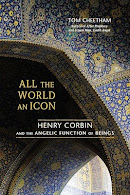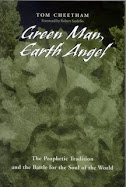"...the Imagination (or love, or sympathy, or any other sentiment) induces knowledge, and knowledge of an 'object' which is proper to it..."
Henry Corbin (1903-1978) was a scholar, philosopher and theologian. He was a champion of the transformative power of the Imagination and of the transcendent reality of the individual in a world threatened by totalitarianisms of all kinds. One of the 20th century’s most prolific scholars of Islamic mysticism, Corbin was Professor of Islam & Islamic Philosophy at the Sorbonne in Paris and at the University of Teheran. He was a major figure at the Eranos Conferences in Switzerland. He introduced the concept of the mundus imaginalis into contemporary thought. His work has provided a foundation for archetypal psychology as developed by James Hillman and influenced countless poets and artists worldwide. But Corbin’s central project was to provide a framework for understanding the unity of the religions of the Book: Judaism, Christianity and Islam. His great work Alone with the Alone: Creative Imagination in the Sufism of Ibn ‘Arabi is a classic initiatory text of visionary spirituality that transcends the tragic divisions among the three great monotheisms. Corbin’s life was devoted to the struggle to free the religious imagination from fundamentalisms of every kind. His work marks a watershed in our understanding of the religions of the West and makes a profound contribution to the study of the place of the imagination in human life.Search The Legacy of Henry Corbin: Over 800 Posts
Wednesday, April 25, 2018
Seven Types of Atheism
John Gray explores fixed idea, unquestioning atheism in his new book Seven Types of Atheism
THE IRISH TIMES
Tue, Apr 24, 2018, Patrick Freyne
John Gray is a self-described atheist who thinks that prominent advocates of atheism have made non-belief seem intolerant, uninspiring and dull. At the end of the first chapter of his new book, Seven Types of Atheism, he concludes that “the organised atheism of the present century is mostly a media phenomenon and best appreciated as a type of entertainment”.
He laughs when I remind him of this sick burn. “I wrote the book partly as a riposte to that kind of atheism,” he says. “There’s not much new in [new atheism] and what is in it is a tired recycled version of forms of atheism that were presented more interestingly in the 19th century. In the so-called new atheism people are [presented with] a binary option between atheism, as if there was only one kind, and religion, as if there was only one kind of religion. [It’s] historically illiterate.
“They don’t even know when they’re repeating ideas from the 19th or early 20th century . . .They don’t know anything of the history of atheism or religion. They’re also very parochial about religion. They take religion to be, not even monotheism or Christianity [but] contemporary American Protestant fundamentalism . . . It’s a parochial, dull debate. I thought of having a subtitle called Why the God Debate is Dead.”
In Seven Types of Atheism, Gray explores the rich philosophical history of non-belief and enlivens it with entertaining tales of humanists like August Comte who so believed in human co-operation he designed clothes that couldn’t be put on without assistance and “god-haters” like the Marquis de Sade whose life was lived in debased defiance of the divine. READ MORE
Friday, April 20, 2018
Every Sufi master is, in a sense, a Freudian psychotherapist
University of California, Davis.
Her latest book is
The Arabic Freud: Psychoanalysis and Islam in Modern Egypt
Even in the most revolutionary thinkers, you will find the uncannily familiar. Sigmund Freud was no exception. Arabs recognised in Freud’s body of thought ideas from classical Islamic thinkers. In the 1940s and ’50s, when intellectuals translated Freud’s work into Arabic, they reached out to Ibn Arabi, the great 12th-13th-century Sufi mystic philosopher. The Egyptian playwright and novelist Tawfiq al-Hakim dates the impulse to blend traditions as far back as Alexander’s conquest of Syria and the eventual translation of philosophical works from Greek to Syriac.
Under Roman rule, Egypt was a centre of learning and part of a shared classical intellectual world, which included Alexandria as much as it did Athens and Rome. Subsequently, Greek philosophy, and particularly the works of Plato and Aristotle, had been energetically translated into Arabic throughout the early Islamic period, contributing to the vitality of Hellenic philosophy. For al-Hakim, Greek ideas were poured into the mould of Islamic philosophy. This process was also evident in al-Hakim’s own work combining Greek tragedy and Islamic legends, in order to effect what he called an ‘intermarriage between two literatures and two mentalities’. It is not at all surprising, then, given this tendency to draw on shared traditions, that Arab intellectuals turned to a mystical Islamic vocabulary when translating Freud in the middle of the 20th century.
This includes the nice detail that Lacan knew of Ibn 'Arabi through reading Corbin.
Thursday, April 19, 2018
Shayegan: Trials and Tribulations of an Iranian Philosopher
London - Amir Taheri
“We had one life, after all,” said the Daryush Shayegan as he sipped his double espresso as if it were the nectar of gods. “The question is: what did we do with it?”
The scene was a just over a year ago in a café in Paris’ posh Avenue Alma Marceau where we had gathered for lunch with a mutual friend, Professor Shahin Fatemi. At the time none of us knew that Daryush was on his last visit to the French capital which he had always regarded as a second home and that, a year later, he would pass away in his first home, his beloved Tehran.
Last Monday, a small group of mourners attended the burial ceremony in Tehran of the 83-year old Daryush under the watchful eyes of “Islamic Security” deployed to make sure there will be no “disturbances.”
The answer to Shayegan’s question, “what did we do with our life”, is both simple and complex in his case.
He has been described as polymath, philosopher, poet, mystic, linguist, and master in “Eastern” civilizations, whatever that means. But he had also dabbled in literary criticism, historic research, and, theological speculation. Moreover, he was also a keen collector and connoisseur of objects of art, books, and calligraphy.
Perhaps as a side-line, he had also dabbled in grand political strategy by promoting the concept of “a dialogue of civilization” which was first adopted by Empress Farah and, after the mullahs seized power in Tehran, Hojat al-Islam Muhammad Khatami who served as President of the Islamic Republic for eight years.
However, those who knew him best remember him for his passionate love of Iran, almost bordering on idolatry, and what he described as his lifelong love affair with the Persian language.
Subscribe to:
Posts (Atom)










